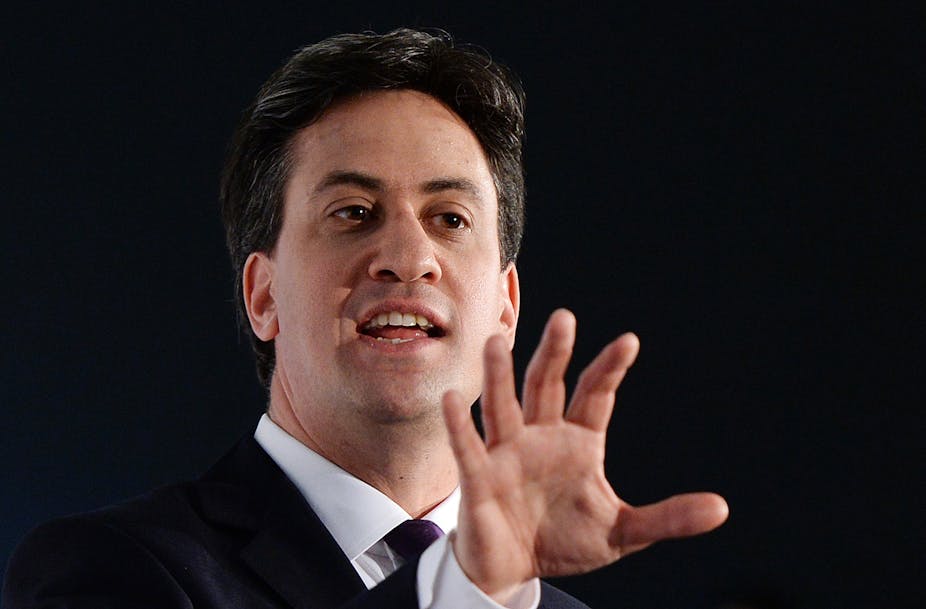The collective sigh of relief will be almost audible in Manchester this week as the Labour party gathers for its annual conference. The minds of the party leadership have been thoroughly distracted in recent weeks by the Scottish referendum but, with Scotland now firmly within the union, they can now focus on the real issue at hand – the 2015 general election.
Ed Miliband has already announced a pledge to raise the minimum wage to £8 an hour by the end of the next parliament and more is to come. We can expect to hear promises for the NHS, social care for the elderly, housing and employment prospects for the young.
Into battle
The key, for Miliband and his party, is the big picture. Here Labour confronts a number of challenges. Valence theory tells us that few voters engage in any serious scrutiny of the rival policies put forward by political parties or even of the principles underpinning them. When they go to the ballot box, they make a judgement about the perceived relative capacity of the parties to deliver the goods. That might mean living standards, price stability, unemployment or any number of things. The point is how they make that judgement.
Valence theory suggests they do it with cognitive shortcuts or heuristics, the most important of which is an evaluation of party leaders. The leader who seems more competent or trustworthy is assumed to be more capable of realising policy ambitions. What really matters is how people feel (not think) about leaders – whether they like or dislike them and whether or not they find them congenial and attractive.
Labour’s problem is that Miliband trails well behind the prime minister in this respect. Cameron is not particularly popular, but he comes over as competent, slick and self-assured while his Labour opponent is seen as “geeky” (whatever that means), aloof and uncharismatic.
The reasons for Miliband’s lack of popularity are something of a mystery, though the unremitting hostility of most of the press does not help. But the cause matters less than the fact. Miliband could probably only dislodge these public perceptions if he became prime minister and proved his doubters wrong – an unenviable catch-22 situation.
The big question
Valence theory also suggests that managing the economy is the central battleground for political parties. It’s the big ticket issue in any election and here Labour lags well behind the Tories again. The majority of voters seem to have convinced themselves that the last Labour government – more precisely, Gordon Brown – was almost single-handedly responsible for the global financial crash. Absurd this may be, but the party has struggled to counteract the view that the country is suffering the after effects of a Labour-induced recession.
In formulating an alternative to Conservative economic policy, Miliband has been hampered by divergent views within Labour’s ranks. On the the right of the party, assorted Blairites – and Ed Balls too – argue that Labour must demonstrate its “fiscal responsibility” and commit itself to very tight control of public spending. At the same time though, the right of the party is keen to avoid any tax measures that might upset the financial markets and big business.
Those on the Keynesian centre and left, and within the unions, dub this approach “austerity-lite” and dismiss it as unappealing, divisive (within the party) and economically unsound.
Recently Miliband has seemed to lean towards the right when it comes to the economy but he is faced with a dilemma if he continues on this path. How can he deplore the demise of public services, the looming crisis within the NHS, the scarring levels of inequality and the intensifying impoverishment of the disadvantaged without promising to do something about it? What would happen to the party’s credibility?
He equally needs to tackle significant anxieties about immigration and social security in a way that pleases voters but doesn’t undermine Labour values.
Bright skies over Manchester
Notwithstanding, there are some reasons to be hopeful at this crucial pre-election conference. So far, Labour has concentrated its fire on the cost of living crisis and it may well be that with living standards for the bulk of the population shrinking, this will resonate with voters. Despite the economic recovery, the Tories have polled consistently in the low 30s and time is running out.
Conference goers are also highly likely to talk about the threat to the Tories from UKIP and how they must now being ruing their opposition to the Alternative Vote, with so many marginal seats under threat from Nigel Farage’s upstarts.
And while the Conservatives battle on the right, Labour can take hope from the Scottish referendum’s extraordinary turnout of almost 85%. This shows that mass mobilisation of the previously politically disaffected and indifferent is possible elsewhere in the UK – and Labour would be the main beneficiary.
Success at next year’s election depends on the capacity of Labour’s leaders to impart a clearer message and a stronger sense of strategic direction. The party has had a small but persistent lead over the Tories in the polls for quite a while. Whether that lead will be enough to secure victory will be the question on everyone’s mind this week in Manchester.

